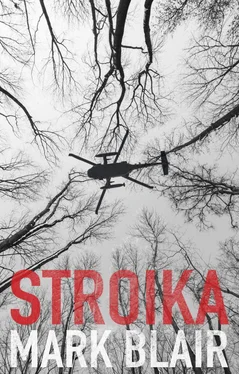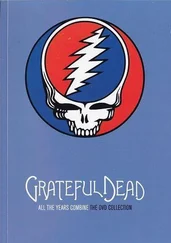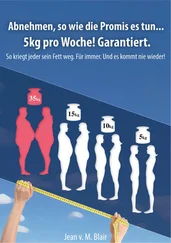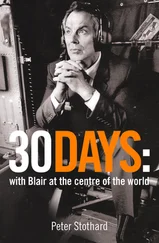Outside, a soldier shouted something towards the sentry box. In the near distance, snow-capped domes cast themselves against a deepening grey sky and blue and brown high rises. The Dnieper eased its way lugubriously towards them.
‘I think I’m going to die of cold,’ Viktoriya said, hugging herself for warmth. ‘How long do you think he will keep us waiting?’
‘We’re early,’ he reminded her.
Outside, the crunching of tyres alerted them to a jeep pulling up in front of their hut. A young man in his early thirties wearing a padded khaki winter Afghanka and a grey fish fur ushanka climbed out and bounded up the narrow cindered path towards their hut. Misha wondered if he had been sent by the colonel to collect them.
‘I see they’ve put you in the warmest room,’ he said with a wide grin on his face. He was tall, perhaps six foot two, broad-shouldered with thick dark eyebrows and close-cropped black hair. His blue eyes darted between him and Viktoriya. The two red stripes and three gold stars on his chest gave him away.
‘Colonel Marov?’ Misha said, extending his hand.
The young colonel pulled off his gloves and shook hands.
‘I think we should go somewhere a bit more comfortable, certainly somewhere warmer. The city is only a few minutes away. I know a restaurant; the food’s passable, not great… if you haven’t eaten lunch yet?’
‘That would be fantastic,’ said Viktoriya with obvious relief. The colonel’s natural exuberance had already begun to snap them out of their low mood.
The restaurant was warm, hot even. They peeled off their winter coats and hung them over their chairs. A young waitress, recognising the colonel, made a beeline for them.
‘Sausage and cabbage with rye bread or hot cheese pasties today, Colonel.’
‘Like the rest of the week, Alisochka.’
‘The sausage is new, sir.’
Misha noticed that the colonel had used her diminutive name. Alisochka’s eyes hardly left Marov’s.
‘Have you seen the freighter cab yet?’ the colonel asked once they had made their choice. ‘Not that there is much that can be done with it… spare parts, perhaps.’
On arrival they had been directed to the burnt and bullet-ridden Kamaz in the military vehicle park close to the gate. It was a wonder anyone had survived, Misha thought.
Viktoriya shook her head. ‘I doubt even that. Can you dispose of it?’
He nodded.
‘You were in the forces?’ he said, turning to Misha.
‘Conscript, rose to the rank of corporal, two years in Afghanistan, 1981 to 1983, more of a fixer than a fighter. ’ Misha reflected on how he had become a sort of unofficial quartermaster with generally more success than the official version at procuring anything from cigarettes to mortars.
‘Well, fixing is often a lot more useful, and now… still the fixer?’
‘Colonel, you probably have a better idea about what I do than I do.’
There seemed little point in beating about the bush. After all, how many Leningrad freighters had the colonel seen carrying merchandise across the border from Western Europe?
‘The last time I looked at a manifest it was computers, fashion, perfume, CDs, players, TVs… and oh, brandy,’ he added, almost as an afterthought, a faint crease of amusement on his face.
The door opened, and a man walked in and took a table in the far corner of the room.
‘How many men under your command, Colonel?’ Viktoriya asked. ‘You have quite a border to patrol.’
‘Twenty thousand regulars and conscripts,’ he replied, as though it were nothing in itself. The colonel turned and looked at the man who had just walked in. He was reading a newspaper, a steaming hot cup of tea in front of him.
He turned back to address Viktoriya.
‘And you are a friend of Konstantin Ivanivich Stolin?’
Viktoriya blushed, taken by surprise, not knowing quite how to respond. He had clearly done his homework.
‘The three of us all went to school together,’ Misha cut in. He’s the main reason I ship my stuff through Smolensk. He and the local military have Leningrad pretty much under siege when it comes to freight: land, sea or air. You, on the other hand, seem more reasonable, Colonel.’
Misha noticed that the man in the corner had not turned the page of his newspaper.
‘KGB…’ said the colonel. ‘Old habits die hard… at least it keeps them out of trouble.’
‘Are you a security risk?’ Viktoriya half joked.
‘We all are… the question is to whom? There are so many opposing views and factions.’
‘And which side of the debate are you on?’ Viktoriya asked, trying to regain the initiative.
‘Progress…’
The colonel looked at his watch. Misha decided it was time to come to the point. He wished he had more time to get to know him but his gut feeling told him that the colonel was someone they could trust. He hadn’t robbed them thus far.
‘I think we are on the same side, Colonel. Progress comes in many forms. I provide people what they want… and make a profit – still a dirty word in Russia – doing it. And there are, of course, plenty of people who try and stand in my way. I am sure this is not foreign to you.’
The colonel did not reply but continued listening.
‘I am starting a new venture. It has some small but important political backing in Leningrad, buying diesel and oil from state companies and shipping it across the border.’
‘At Smolensk.’
‘Exactly.’
‘And you want my support.’
‘Yes.’
‘And for me?’
‘A stake in the business, a significant stake. I need partners, long-term partners with the same interests. There are going to be plenty of opportunities out there. It strikes me that you are just the sort of person we need… progressive, by your own admission – not like Vdovin in Leningrad – of a similar age to us, plenty of contacts, and you can organise… like Viktoriya here. I could go on. Weren’t you strategic command in Afghanistan?’
‘Yes.’
‘Graduated top at the General Staff Academy, a rising star until your reformist views had you consigned here. Somehow I don’t think you are the sort of person who will be held back long, and in the meantime… this is an opportunity – dare I say historic – to make serious money. The smart communists already have a sniff of it, but years of doing what they are told has deadened their senses. The world belongs to our generation now, at least Russia…’
The colonel nodded, stood up abruptly and held out his hand. ‘Let me think on it. I have to take my minder for a walk now. It’s been a pleasure meeting you both.’
And with that, he and the man in the corner were gone.
LENINGRAD NIGHTCLUB
General Vdovin leaned forward and helped himself to a Cohiba from the lacquered box sitting on Konstantin’s desk. Dance music interspersed with loud cheering and clapping filtered from the club floor above. Someone wolf-whistled, joined by several others.
‘Busy night?’ he asked in between puffs of the aged cigar. ‘This is very good.’ He helped himself to another and put it in his jacket pocket.
‘Help yourself,’ Konstantin said sarcastically.
Despite the millions he had placed in the general’s Zurich bank account, Vdovin still clung to the old dress code: an ill-fitting dark grey double-breasted suit. Konstantin could even picture the store he purchased it from in the GUM arcade opposite the Kremlin, one of those outlets exclusively reserved for party members. It was a joke, ridiculous, that such things were still regarded as a sign of privilege. He wondered which bright bureaucrat years ago had come up with the original design and how many committee meetings he had had to endure while the lapel size and number of cuff buttons were finally determined. Konstantin reached for a cigar himself, and, without lighting it, put it in his mouth.
Читать дальше











